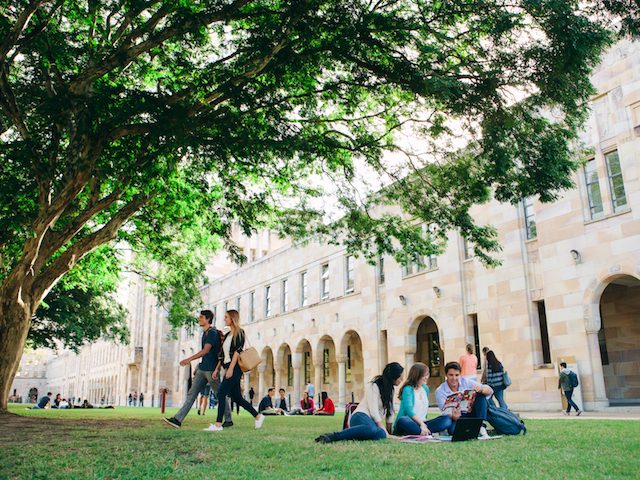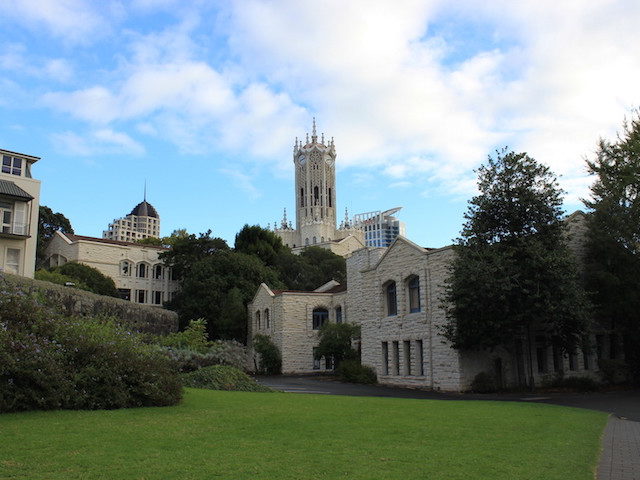When counselling applicants who are interested in pursuing their entire undergrad or graduate degree program in … Read more
Bachelor’s Degree Abroad
You can complete a full bachelor’s degree abroad in Australia or New Zealand in less time than it would take in the U.S. while immersing yourself in another country and culture. With a leading global reputation for quality higher education institutions, livable cities, varied environments, and countless adventures, both Australia and New Zealand offer incredible opportunities. Our expert team will help you find the right program and location for your needs, answer any questions you have, and guide you through the application process at no cost to you. Advance your education, dive into a different culture, make international connections, and have an unforgettable life experience. We’ll show you how!
Highlights
Benefit from Australia and New Zealand’s globally recognized higher education systems with highly-ranked institutions across the region
Connect with an international community, living in a different country while getting to know both locals and other international students
Complete your degree more quickly and affordably than in the U.S. (Programs often cost less than out of state or private tuition in the U.S. and are typically three years long.)
Access specialized programs – such as medicine, physiotherapy and veterinary medicine – as an undergrad
Choose from bachelor’s programs at public universities across Australia and New Zealand with our Full Degree Programs team guiding you on the best university and degree for you
Live and study in some of the world’s most liveable locations, known for their safe cities, outdoor lifestyles, incredible landscapes, and friendly communities
Take advantage of the opportunity to work part-time while studying with minimum wages set at over $19/hour
Bachelor's Degrees
LIBERAL ARTS, HUMANITIES, BUSINESS, SCIENCE DEGREES
A bachelor’s degree in liberal arts, humanities, communications, business, and science-related fields in Australia and New Zealand typically takes three years to complete. Since there are no general education requirements, you start immediately in classes geared toward your major. Some universities with a trimester system allow students to complete the degree in just two years.
PROFESSIONAL PROGRAMS
Professional degree programs prepare students for degrees in specific fields, such as teaching, nursing, medicine, engineering, etc. A bachelor’s degree in professional fields can take between 4-6 years of full-time study.
Some professional fields that are only available as graduate programs in the U.S. are available at the undergraduate level in Australia, such as medicine, dentistry, veterinary science, and chiropractic.
Universities
UNIVERSITIES
TEAN represents universities across Australia and seven New Zealand’s universities, giving you direct access to lauded academic institutions. With several universities regularly recognized as some of the world’s best, universities in both countries are known for offering high-quality, comprehensive programs.
| Australian Universities | New Zealand Universities |
Degree Recognition
DEGREE RECOGNITION
While you may or may not be familiar with the university to which you are applying, TEAN’s partner universities are highly recognized institutions known around the world for academic excellence and leading research.
Your degree from an Australian or New Zealand university will be recognized by both employers and universities worldwide. The majority of our university partners are also recognized and have approval from the U.S. Department of Education to participate in the Federal Financial Aid program.
Bachelor’s degree-level programs in Australia and New Zealand are structured slightly differently to the U.S., following the British model of higher education with a three-year bachelor’s degree. This means you graduate one year earlier than your U.S. friends, which can be an advantage. Students enter their major area of study from the start of their degree. There is no general education component and few electives.
However, if you’re considering graduate school in the U.S., we encourage you to research different programs that accept a three-year bachelor’s degree since some graduate schools require students to have completed a four-year program. Contact graduate schools to discuss or external organizations, such as www.wes.org, that can offer advice.
Degree Recognition for Professional Programs
Some professional fields of study, such as education, law, nursing, medicine, dentistry, and psychology, are connected to an accrediting body, and you will need to have your degree assessed to meet U.S qualifications and eligibility to work in that field. These kinds of professions may require you to complete further studies or exams when you return to the U.S. to ensure your degree is comparable to the U.S equivalent and recognized in the state you want to work. We encourage you to research how to transfer a degree of this kind back to the U.S. before applying for programs.
Academic Calendar
ACADEMIC CALENDAR
For most Australian and New Zealand universities, the academic year runs from February to November. The first semester runs from February to June, and the second semester runs from July to November. Intakes occur in February or July each year. February is the primary intake period and preferred commencement date when planning your studies. Not all programs are available in July.
Contact us to get exact start dates for the specific programs you’re considering.
Tuition & Finances
TUITION
Tuition costs vary by university and degree program. The average tuition cost/year of a bachelor’s degree in Australia and New Zealand is approximately $18,000-$28,000 USD.
LIVING COSTS
Students should budget a minimum of approximately $15,000 USD per year ($20,000 AUD/NZD) for living expenses.
FINANCIAL AID
While tuition fees tend to be lower in Australia and New Zealand compared to out-of-state fees and private colleges in the U.S., you may still require financial assistance to complete your degree program. While TEAN cannot process and distribute financial aid, we can assist and advise you on application procedures and available funding sources.
U.S. FINANCIAL AID / FEDERAL LOAN PROGRAM
Most Australian and New Zealand schools are accredited by the U.S. Department of Education to administer the U.S. Direct Loan Program (U.S. Financial Aid/Federal Loan Program) to U.S. citizens. This means if you are enrolled in a full-time bachelor’s degree, you can take out U.S. loans to cover some of the costs. Contact us for more information on which schools participate and how much you can borrow. For bachelor’s degrees, students are typically only eligible for minimal loan amounts unless you are a dependent. You may also be eligible for a Stafford Loan for your degree program, along with the repayment and deferment schemes it includes.
To apply for U.S. Federal Financial Aid you will need to complete a FAFSA (Free Application for Federal Student Aid) available from the U.S. government beginning in November of the year prior to which it is applicable. Your FAFSA is due on or before March 15. TEAN cannot process the FAFSA, but we understand that it can be confusing at times and can guide you through the process.
Eligibility
ELIGIBILITY
In addition to providing your official academic transcripts from high school when applying to a program, you are also typically required to provide SAT or ACT scores.
The minimum GPA requirement is 2.5, however many universities have higher requirements.
Some schools also require specific AP exams and scores for entry.
If you are currently an undergraduate student in the U.S. and hope to transfer to an overseas university to complete your degree, you may not need SAT or ACT scores to gain admission. If you have completed 30 or more credit hours at an undergraduate level, this may be sufficient for entry. If you have not completed 30 credits, you will most likely need to submit your high school transcripts and SAT or ACT scores. You should also submit syllabi of all previous university coursework and all college transcripts. Additionally, if you have an associate degree, SAT/ACT scores may not be required for entry into a bachelor’s degree.
How we Help
SELECTING A PROGRAM
Going to university in Australia or New Zealand is an incredible experience, but figuring out to set up everything on your own can be a difficult process.
TEAN’s Degree Programs Manager has more than 15 years of experience working with universities in Australia and New Zealand and can provide personalized guidance to help select the university and degree that’s the best fit for you.
If you want advice on programs and universities, contact our Degree Programs Manager.
HOW TO APPLY
If you know the program/s you want to apply for, contact the Degree Programs Manager to receive details on the specific application process for your selected program/s.
There is no fee to use our services, and some universities we work with waive your application fee if you apply through TEAN.
We recommend applying 6-12 months in advance of the program start date and no later than four months prior to the program start. University deadlines are usually three months prior to the start date, but we advise you to start the process much earlier.
Most institutions have “rolling admissions,” meaning you can apply at any time. However, some program applications are only open at set times (such as in medical fields), so please ask us for deadlines for your selected program/s.
TEAN’s Degree Programs Manager will provide you with all you need to apply for your chosen program and will submit the application on your behalf.
You will need to send one set of official transcripts to TEAN’s U.S. office. (Even if you are applying for multiple programs, you will only need to submit one set of transcripts to TEAN.) As a representative of the universities, TEAN will certify your transcripts on your behalf and use them for multiple applications.
Applications also require a copy of your passport. However, if you are currently renewing your passport or don’t have one yet, please go ahead and submit your application to TEAN. The overseas university can still evaluate your application and grant you a conditional acceptance until you can send a copy of your passport.
If you have taken college courses and would like to transfer credit, you will be able to indicate this in your application. Transfer credit is determined by the university to which you are applying. TEAN cannot make a determination or evaluation of previous coursework. If the overseas university grants you admission into a full degree program, your acceptance will indicate which courses will and will not transfer.
You should expect a response from the university within 3-12 weeks. Since TEAN’s Degrees Program Manager is based in Australia, in the same time zone as the schools, she will follow up on your behalf with the universities.
In some cases, the university will contact you directly with the outcome of your application. Other times, TEAN will notify you. Either way, you will receive notice as soon as a decision has been made.
When the university or universities send you an offer, you then need to accept your offer officially. In some cases, universities issue a conditional offer. This means that you may need to meet a condition before a non-conditional offer can be made. (For example, successfully completing your bachelor’s degree.)
PRE-DEPARTURE PROCESS
Once you have accepted a place at an Australian or New Zealand university and paid your deposit, your selected university will send you the documentation needed to apply for a student visa, as well as other pre-departure materials with details on accommodation options. TEAN can provide ongoing assistance and advice regarding housing.















